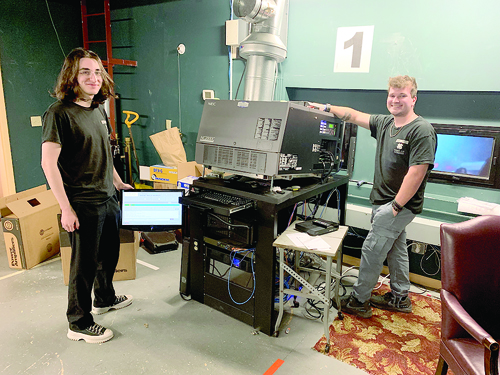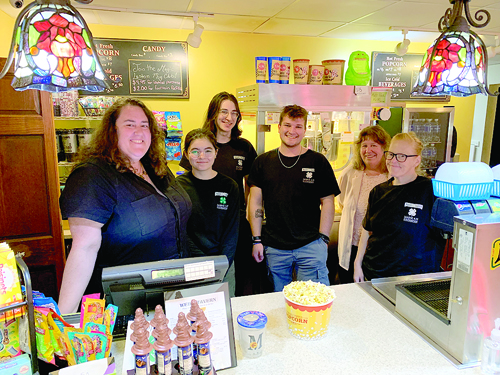It’s a balancing act to keep Magic Lantern’s big screens lit

By Wayne E. Rivet
Staff Writer
As the lights dimmed, three kids sitting in the front row went quiet.
Their eyes fixated on the big screen as they watched in bewilderment as “Roz” — the shipwrecked robot in the highly successful “The Wild Robot” movie — wandered through the forest of an uninhabited island.
Their silence broke and giggles sounded as Roz made its first encounter with a skunk, a family of possums and a manipulative fox.
“I love the movies,” one youngster said to the others, shoveling a handful of popcorn in his mouth.”
“Me too,” the other responded, enjoying a piece of candy.
That conversation is likely music to the ears of Susan Jennings, executive director of the Maine 4H Foundation, and Jenni Ricci, theatre manager, who say if the big screen experience is to survive, people need to return to the theater.
“I think all of the theaters are struggling. People are sitting on their couches and watching movies there instead of coming to the theater,” Jennings said. “The reason why we’re alive, and this is the number one reason we’re still alive, is because of donations — we’ve had donors which we then name part of the theater after them. We never named the outside of the theater because Frank didn’t want his name on it, and he was the biggest investor. He’s allowing us to put a name out there, a naming opportunity for a big donor. We would endow it. Then, it’s income every year coming off the endowment.”
Frank Howell and his family wanted to see the beautifully crafted theater to be used for both educational purposes, as well sticking to its roots as a first-rate movie experience venue. The sale to the Maine 4H Foundation resulting in the Magic Lantern Innovation Center was the perfect move forward, keeping the facility as a viable and active gem anchoring Bridgton’s downtown.
But, like all movie house, the Magic Lantern is facing struggles too.
“We get income from the theater, income from the restaurant, but it’s not enough to pay all the bills,” Jennings and Ricci said. “To be very honest, there’s just not enough revenue coming in. So, we rely on revenue from other sources, like our educational programming and specialty events. If this was just a theater, we would’ve gone under.”

Part of the lure to streaming services is cost. Admittedly, the price of the theater experience can be costly for a family of three, four or five when tickets and snacks — popcorn, candy and soda — push the day or night out toward $80 to $100. Today, new releases appear both in theaters and on streaming services either at the same time or within a week or two.
“It used to be you would wait nine months or longer for a movie to reach DVDs. Not today. In some cases, you can stream a new movie that is showing at the theater,” Ricci said. “People don’t realize that every movie we bring in, we’re getting less than half. It might even be 60% of each ticket sale goes back to the movie company. We’re only making a few bucks on selling every movie ticket. What keeps us alive is doing other events and donor support.”
Jennings noted that while Maine 4H backs the Magic Lantern Innovation Center wholeheartedly, “it does have to get to the point with donor funding and running this facility breaks even. We’re not about making money, we’re a non-profit. It’s about keeping it alive and doing things for the community.”
The harsh reality, however, is even a non-profit has bills that need to be paid — every day expenses like heat, lights, staffing, etc. along with trying to upgrade equipment like projectors.
“There’s a lot of folks who truly love the movies, but in order for places like ours to stay afloat, people need to come in and support us,” Ricci added.
Another out-of-their-control element is what Hollywood produces. Coming out of the Covid pandemic, theaters not only battled convincing the public it was safe to return, operators had slim pickings to show, at first. Recently, the production of movies was reduced to a trickle because of a writers’ strike. Meanwhile, theaters had to scramble to fill its show schedules.
Ricci was actually working in Los Angeles when the strike hit.
“I started here in January, which is when we really started feeling the lull of big release movies. Animation movies were being pushed back, sometimes indefinitely, sometimes a year or two,” she said. “For about six months, every now and then there would be a decent film, so we filled in the blanks in the schedule with Indie and foreign films.”
Unfortunately, there are a number of quality “smaller films” on the market, but because those typically lack pre-showing exposure, “people don’t come to those,” Ricci said. “A lot of it comes down to the actual distribution company that you’re working with. It’s not even necessarily who created the film. It’s actually who is distributing it. Because we’re a smaller theater, we cannot always have access to some movies. We do first-run movies. We can have access to anything that’s coming out this first run. But what it comes down to is the relationship with distributors. There are tons of distribution companies and it depends on how they’re releasing the film. If they’re doing a limited run or a wide release. If it’s a wide release, that’s pretty much any theater can pay the advance, pay the percentage and get the film. If it’s limited, it is certain markets that they’re looking to hit like New York, Boston, Chicago. Then, they will simultaneously release it online.”
Ricci says the key is developing relationships with distributors.
“We’ve been trying to build up new relations. We just started one two distributors, which we didn’t have access to before. We recently showed a movie from one of them. So now, we have one film under our belt, and depending on how it does, will kind of depend on what we’re offered going forward with,” Ricci noted.
Landing films can be dependent of facility size — three screens vs others that have six or more — and the hours of operation. While some cinemas are open seven days a week with multiple show slots, the Magic Lantern has fewer hours, mainly due to cost and staffing availability.
“We try to run three different ones. Every film has its own parameters as to what the distribution company wants and expects,” Ricci added. “It’s tough because some companies have minimum $500 guarantees. You’re paying regardless if one person comes or 50 people come. If we have an empty theater, we would’ve rather had a comedian group or something else going on in that theater.”
Conversations are had frequently with movie enthusiasts as to what they like, what they would like to see more of and what might land on their thumbs down list. It’s all about getting people to spend their valuable time and money at the Magic Lantern.
“No question, we need the communities’ support to stay in business,” Jennings said.
As big screens across the country go dark, including the Mountain Valley Mall Cinemas in North Conway, N.H. this month after 30 years of operation, Jennings says the Magic Lantern has diversified its programming in hopes of avoiding the same fate. To pick up the slack created by dwindling movie ticket sales caused by increasing use by the public of streaming services, the Magic Lantern has added comedians and a psychic along with showing special documentaries and films to its repertoire.
The closure of the Mountain Valley Mall Cinemas has created a void for movie enthusiasts in the Valley, who now face either a 40-minute trip to Bridgton or an hour or more venture to Meredith or Lancaster, N.H. to see a show.
Without community support Jennings says, keeping the big screen on will be tough to do.

